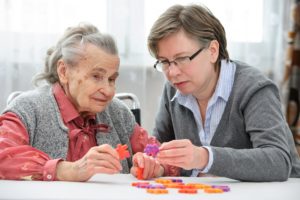
Although previous studies have shown exercise and cognitive fitness are one of the best ways to prevent or slow Alzheimer’s disease, this is the first to conclude that that the same types of behaviors can benefit people with FTD, which is caused by a distinct form of brain degeneration.
“This is a devastating disease without good medical treatments, but our results suggest that even people with a genetic predisposition for FTD can still take actions to increase their chances of living a long and productive life. Their fate may not be set in stone,” said Kaitlin Casaletto, Ph.D., assistant professor of neurology at the UCSF Memory and Aging Center and corresponding author of the new study.
FTD is a neurodegenerative disease that can create changes in personality, language, movement abilities, and decision making. It is the most common form of dementia and typically occurs in people between the ages of 45 to 65 with about 40 percent of those with a family history of the disease.
FTD usually results in rapid cognitive and physical decline and death in less than 10 years. There are currently no pharmaceutical treatments or cures for FTD, though numerous trials are underway at UCSF Memory and Aging Center and elsewhere.
“There’s incredible variability in FTD, even among people with the same genetic mutations driving their disease. Some people are just more resilient than others for reasons we still don’t understand,” said, Casaletto, a member of the UCSF Weill Institute for Neurosciences. “Our hypothesis was that the activities people engage in each day of their lives may contribute to the very different trajectories we see in clinic, including when the disease develops and how it progresses.”
Large Multisite Studies
For the research, Casaletto and her colleagues studied 105 people with dominant, disease-causing genetic mutations who were mostly asymptomatic or had experienced early-stage symptoms. Participants were drawn from two large multisite studies, called ARTFL and LEFFTDS led by co-authors Adam Boxer, MD, Ph.D., and Howie Rosen, MD, also of the UCSF Memory and Aging Center.
All participants underwent initial MRI scans to measure the extent of brain degeneration caused by the disease. They also completed tests of thinking and memory and reported on their current levels of physical and cognitive activity in their daily lives. Family members of the participants also completed assessments of how well they were functioning in their daily lives such as managing finances, bathing themselves, and taking medications.
Casaletto and her team reported seeing significant results in participants in differences in the speed and severity of FTD in as little as two follow-ups. They found that functional decline was 55 percent slower in the most active 25 percent of participants compared to the least active five percent.
“This was a remarkable effect to see so early on,” Casaletto said. “If this were a drug, we would be giving it to all of our patients.”
With this new information, researchers want to extend the study to include more detailed and objective assessments of participants’ mental and physical activity including fitting them with activity sensors to help estimate exactly how much activity is needed to promote cognitive resilience. Casaletto hopes the findings will encourage those with FTD to adopt lifestyle choices that could result in more productive years of life.